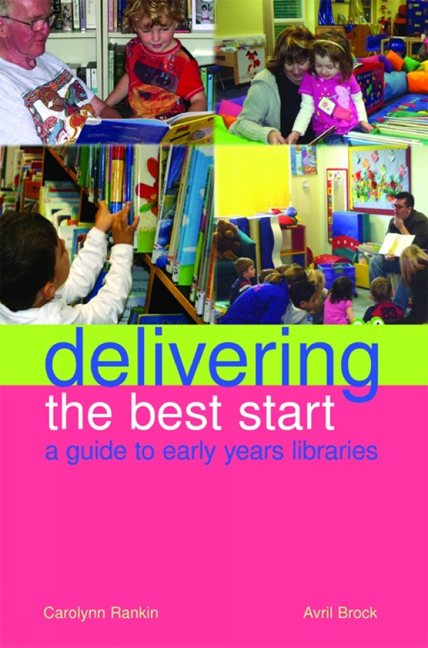Book contents
- Frontmatter
- Contents
- Preface
- Introduction
- Acknowledgements
- 1 Take them to the library – setting the scene
- 2 People and partnerships, skills and knowledge
- 3 Buildings, design and space
- 4 Resources for early years libraries – books, toys and other delights
- 5 Reaching your audience – the librarian's role
- 6 Planning
- Appendix: Early Years Library Services fit with central provision
- References
- Index
2 - People and partnerships, skills and knowledge
Published online by Cambridge University Press: 08 June 2018
- Frontmatter
- Contents
- Preface
- Introduction
- Acknowledgements
- 1 Take them to the library – setting the scene
- 2 People and partnerships, skills and knowledge
- 3 Buildings, design and space
- 4 Resources for early years libraries – books, toys and other delights
- 5 Reaching your audience – the librarian's role
- 6 Planning
- Appendix: Early Years Library Services fit with central provision
- References
- Index
Summary
Introduction
This chapter addresses the role of professionals in the interdisciplinary work involved in meeting the varied needs of the local community. It is particularly concerned with the roles of early years librarians and early years specialists as they seek to develop effective partnerships across the disciplines as well as foster partnerships with parents and carers. It considers how these professionals can provide quality, focused services and help to break down the barriers to those services that may be apparent in the community. Drawing on practice, the chapter also discusses the issues of developing effective communication and providing greater accountability to the stakeholders across the disciplines.
Communities give purpose to libraries and it is important that libraries seek to reach out to the local community beyond the library walls. Reading is an invaluable tool that can be used as the basis for connecting with various groups in society – babies and their families, looked-after children, young people at risk, the housebound as well as adults trying to improve literacy skills. Librarians and information workers share a critical value in that it is important to understand the needs of the user communities in order perform this task/function effectively and efficiently. Success in helping people to meet their information needs lies in understanding their difficulties and problems and is dependent on forming good working relationships. Young people are at the heart of the community. To increase their value, libraries can use community profiling to examine the needs of the target audience and determine how those needs can best be met. This may involve redefining the traditional role of the library as well as the traditional role of the librarian. The traditional children's department may need ‘stretching’ by expanding the age and scope of the target audience. For parents and carers, access to information and services during their children's early years is critical, particularly information about how everyday activities are linked to developing literacy and communication skills.
- Type
- Chapter
- Information
- Delivering the Best StartA Guide to Early Years Libraries, pp. 31 - 54Publisher: FacetPrint publication year: 2013



